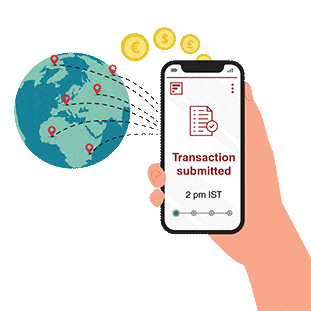CKYC Registry
-
Customer Service Contact us Service request Locate a branch
Find all the help you need
Scan the QR, get our app, and find help on your fingertips

Help CenterSupport topics, Contact us, FAQs and more
-
Login
Are you ready for an upgrade?
Login to the new experience with best features and services
-
Login
Are you ready for an upgrade?
Login to the new experience with best features and services
- Accounts
-
Deposits
IDFC FIRST Bank Deposits
View all Deposits -
Loans
IDFC FIRST Bank Loans
View all Loans - Wealth & Insure
-
Payments
IDFC FIRST Bank Payments
View all Payments -
Cards
IDFC FIRST Bank Cards
View all Cards - Blogs
- Corporate Account
-
Cash Management Services
IDFC FIRST Bank Cash Management Services
View all Cash Management Services - Supply Chain Finance
-
Corporate Lending
IDFC FIRST Bank Lending
View all -
Treasury
IDFC FIRST Bank Treasury
See more details - NBFC Financing
Support topics, Contact us, FAQs and more
- IDFC FIRST Bank Accounts
-
Savings Account
-
Corporate Salary
Account -
Senior Citizens
Savings Account -
First Power
Account -
Current Account
-
NRI Savings
Account -
TASC Institutional
Account -
Savings Account
Interest Calculator
- IDFC FIRST Bank Deposits
-
Fixed Deposit
-
Recurring Deposit
-
NRI Fixed Deposit
-
Safe Deposit Locker
-
FD Calculator
-
RD Calculator
- IDFC FIRST Bank Loans
-
Personal Loan
-
Consumer Durable
Loan -
Home Loan
-
Business Loan
-
Professional Loan
-
Education Loan
-
New Car Loan
-
Pre-owned Car Loan
-
Two Wheeler Loan
-
Pre-owned Two
Wheeler Loan -
Commercial Vehicle
Loan -
Gold Loan
-
Loan Against Property
-
Loan Against Securities
-
Easy Buy EMI card
-
Personal Loan
EMI Calculator -
Education Loan
EMI Calculator -
Home Loan
EMI Calculator
- IDFC FIRST Bank Wealth & Insure
-
FIRST Select
-
FIRST Wealth
-
FIRST Private
-
Mutual Funds
-
Sovereign Gold Bond
-
Demat Account
-
Term Insurance
-
Life Insurance
-
Health Insurance
-
General Insurance
-
Bonds
-
Loan Against
Securities -
Portfolio Management
Service
- IDFC FIRST Bank Payments
-
FASTag
-
Credit Card
Bill Payments -
UPI
-
Funds Transfer
-
Forex Services
-
Pay Loan EMI
- IDFC FIRST Bank Cards
-
Ashva :
Metal Credit Card -
Mayura :
Metal Credit Card -
FIRST Millennia
Credit Card -
FIRST Classic
Credit Card -
FIRST Select
Credit Card -
FIRST Wealth
Credit Card -
FIRST WOW!
Credit Card -
Deals
-
Debit Cards
-
Co-branded Cards
-
Credit Card
EMI Calculator -
FIRST Corporate
Credit Card -
FIRST Purchase
Credit Card -
FIRST Business
Credit Card
- Premium Metal Credit Cards
-
AshvaLifestyle1% Forex₹2,999
-
MayuraLifestyleZero Forex₹5,999
-
FIRST PrivateInvite Only
- Best for travellers
-
MayuraZero ForexMetal₹5,999
-
Ashva1% ForexMetal₹2,999
-
FIRST WOW!Zero ForexTravelLifetime Free
-
FIRST SWYPTravel OffersEMI₹499
-
FIRST Select1.99% ForexLifestyleLifetime Free
-
FIRST Wealth1.5% ForexLifestyleLifetime Free
-
Club VistaraTravelLifestyle₹4,999
-
IndiGo IDFC FIRST Dual Credit CardTravelLifestyle₹4,999
- Max benefits, Free for life
-
FIRST Classic10X RewardsShoppingNever Expiring Rewards
-
FIRST Millennia10X RewardsShoppingNever Expiring Rewards
-
FIRST Select10X RewardsLifestyle1.99% Forex
-
FIRST Wealth10X RewardsLifestyle1.5% Forex
-
FIRST WOW!RewardsTravelZero Forex
-
LIC ClassicRewardsInsuranceShopping
-
LIC SelectRewardsInsuranceShopping
- Reward Multipliers
-
AshvaLifestyleMetal₹2,999
-
MayuraLifestyleZero Forex₹5,999
-
FIRST ClassicNever Expiring RewardsShoppingLifetime Free
-
FIRST MillenniaNever Expiring RewardsShoppingLifetime Free
-
FIRST SelectNever Expiring RewardsLifestyleLifetime Free
-
FIRST WealthNever Expiring RewardsLifestyleLifetime Free
- Rewards & Credit on UPI
-
FIRST Power+FuelUPI₹499
-
FIRST PowerFuelUPI₹199
-
FIRST EA₹NVirtual1% Cashback₹499
-
FIRST DigitalVirtualUPI₹199
-
IndiGo IDFC FIRST Dual Credit CardUPITravelDual cards
- Fuel and Savings
-
FIRST PowerRewardsUPI₹199
-
FIRST Power+RewardsUPI₹499
-
LIC ClassicRewardsInsuranceShopping
-
LIC SelectRewardsInsuranceShopping
- Express and Flaunt
-
AshvaMetal1% Forex₹2,999
-
MayuraMetalZero Forex₹5,999
-
FIRST SWYPEMIOfferMAX₹499
-
FIRST MillenniaRewardsShoppingLifetime Free
- FD Backed rewarding Credit Cards for all
-
FIRST EA₹NVirtualCashback₹499
-
FIRST WOW!Zero ForexTravelLifetime Free
-
CreditPro Balance TransferTransfer & SaveReduce InterestPay Smartly
- IDFC FIRST Bank NRI Forex Solutions
-
Send money to India-Wire transfer
-
Send money to India-Digitally
-
Send money abroad
-
Max Returns FD (INR)
- IDFC FIRST Bank MSME Accounts
-
Platinum Current
Account -
Gold
Current Account -
Silver Plus
Current Account -
Merchant Multiplier
Account -
Agri Multiplier
Account -
TASC Institutional
Account -
Dynamic Current
Account -
World business
Account -
First Startup
Current Account
- IDFC FIRST Bank Business Loans
-
Business Loan
-
Professional Loan
-
Loan Against Property
-
Business Loan for Women
-
Working Capital Loan
-
Construction Equipment Loan
-
Machinery Loan
-
Healthcare Equipment Loan
- IDFC FIRST Bank Business Solutions
-
Payment Solutions
-
Tax Payments
-
Doorstep Banking
-
Point of Sale (POS)
-
Escrow Accounts
-
NACH
-
Payment Gateway
-
UPI
-
Virtual Accounts
-
As per amendment in the Income Tax Rules, PAN or Aadhaar are to be mandatorily quoted for cash deposit or withdrawal aggregating to Rupees twenty lakhs or more in a FY. Please update your PAN or Aadhaar. Kindly reach out to the Bank’s contact center on 1800 10 888 or visit the nearest IDFC FIRST Bank branch for further queries.
-
-
Most Searched
Sorry!
We couldn’t find ‘’ in our website
Here is what you can do :
- Try checking the spelling and search
- Search from below suggestions instead
- Widen your search & try a more generic keyword
Suggested
Get a Credit Card
Enjoy Zero Charges on All Commonly Used Savings Account Services
Open Account Now

Features

Quick transfers using the IDFC FIRST Mobile Banking app

Track your transactions online in real-time

Zero transfer fees

Competitive exchange rates
What is outward remittance?
Sending money abroad is simpler than ever with IDFC FIRST Bank. Whether you're supporting a family member, paying for international services, or investing money abroad, we ensure your funds reach their destination swiftly and safely. You can simply login to the IDFC FIRST Mobile Banking app or net banking to send money abroad from the comfort of your home and track it in real-time. Know more
Alternatively, you may visit your nearest IDFC FIRST Bank branch for complete guidance with transferring funds from your Indian account to any beneficiary’s account overseas Know less
How to transfer
Sending funds abroad is easy with IDFC FIRST Bank by your side. Follow these steps for a seamless fund transfer.
-
Step 1
Login to the mobile app or net banking and click on ‘PAY’.
-
Step 2
Click on ‘Pay Abroad’ and select your Savings Account.
-
Step 3
Add beneficiary and transaction details to confirm your payment.
More detailsOnce processed, your SWIFT copy and Debit advice will be emailed to your registered email address.
Done! The funds will be credited to your beneficiary’s account within 1- 3 working days.
* Based on the purpose of your transfer, additional documents may be requested.
Click here to view documentation
Terms & Conditions –
- PAN card is mandatory for outward remittance under Liberalised Remittance scheme.
- Based on your purpose of transfer, additional documents may be requested.
- In case of a minor remitter, the LRS declaration must be countersigned by the minor's natural guardian.
- The LRS limit of the minor can be utilised but with the PAN of natural guardian. This is applicable where the minor doesn't have a PAN card.


-
Step 1
Walk into your nearest IDFC FIRST Bank branch
-
Step 2
Submit the Application for outward remittance
Form A2 click to download
-
Step 3
Provide the necessary supporting documents*
more detailsDone! The funds will be credited to your beneficiary's account within 1- 3 working days.
* Based on your purpose of transfer, additional documents may be requested.
Click here to view documentation
Terms & Conditions –
- PAN card is mandatory for outward remittance under Liberalised Remittance scheme.
- Based on your purpose of transfer, additional documents may be requested.
- In case of a minor remitter, the LRS declaration must be countersigned by the minor's natural guardian.
- The LRS limit of the minor can be utilised but with the PAN of natural guardian. This is applicable where the minor doesn't have a PAN card.


Remittance Calculator
- Exchange rate USD1 = ₹84.74
- Foreign exchange GST (INR) ₹147.6
-
Intermediary bank charges
₹ 20₹0 -
Exchange fee (INR)
₹ 300₹0
INR equivalent amount
credited will be
₹ 236.02
You saved ₹1,940.00Limits
Here are the details of limits set for transfer:

Resident Indian
USD 2,50,000 and equivalent in a financial year

Non Resident
From NRE A/c: No limit
From NRO A/c: USD 1,000,000 and equivalent per financial year (No limit for current income)

Foreign National Residing in India
Up to net salary received in India (after deduction of applicable taxes)
Charges

Resident Indian : NIL*

NRI : NIL*
- *This does not include the charges levied by the beneficiary bank or beneficiary bank’s intermediary
- GST will be levied on the converted gross INR amount, as per the existing Tax slab. Click here to know the slab wise structure.
- W.e.f. Apr 1, 2025, TCS will be collected by the Bank on remittances made under LRS as per prevailing income tax guidelines.
Zero Processing fee for outward remittance transactions & any correspondent charges incurred are absorbed by the bank
For details on the exchange rates, please click here.


FX Retail Platform


Reserve Bank of India (RBI), through Clearing Corporation of India Ltd (CCIL), has rolled out an electronic trading platform ‘FX-Retail’ where customers have the option to buy and sell foreign outward remittance. FX Retail platform, currently offers Cash/Tom/Spot deals.
For registration, please visit CCIL-FX Retail website,
https://www.fxretail.co.in/#/login
Post successful registration, the limit can be setup by visiting the nearest branch of IDFC FIRST Bank.
For more information, visit the CCIL website or click here
Key benefits

SWIFT GPI
Seamless tracking of transaction starting from the time of initiation till funds reaches beneficiary

Competitive exchange rates
Enjoy attractive exchange rates like never before

Zero fees & charges
Make the most of zero processing fees and zero correspondent bank charges

Easy accessibility
Available to residents and non-resident customers of the bank
Prohibited transactions
LRS facility is not available for the following:
- Remittance for any purpose specifically prohibited under Schedule-I (like purchase of lottery tickets/sweep stakes, proscribed magazines, etc.) or any item restricted under Schedule II of Foreign Exchange Management (Current Account Transactions) Rules, 2000.
- Remittance from India for margins or margin calls to overseas exchanges / overseas counterparty.
- Remittances for purchase of FCCBs issued by Indian companies in the overseas secondary market.
- Remittance for trading in foreign exchange abroad.
- Capital account remittances, directly or indirectly, to countries identified by the Financial Action Task Force (FATF) as “non- cooperative countries and territories”, from time to time.
- Remittances directly or indirectly to those individuals and entities identified as posing significant risk of committing acts of terrorism as advised separately by the Reserve Bank to the banks.
- Gifting by a resident to another resident, in foreign currency, for the credit of the latter’s foreign currency account held abroad under LRS.
Caution regarding unauthorised entities offering foreign exchange (forex) trading facilities
The Reserve Bank of India (RBI) has cautioned customers against unauthorised entities offering foreign exchange (forex) trading facilities to Indian residents with promises of disproportionate/exorbitant returns. These entities may take recourse to engaging local agents who open accounts at different bank branches for collecting money towards margin, investment, charges, etc. These accounts are opened in the name of individuals, proprietary concerns, trading firms etc. and the transactions in such accounts are not found to be commensurate with the stated purpose for opening the account in several cases. It is also observed that these entities are providing options to residents to remit/deposit funds in Rupees for undertaking unauthorised forex transactions using domestic payment systems like online transfers, payment gateways, etc.
Frequently asked questions
General
Process
Charges
Scheme
Limit
Payment
Documents
Payment issue
'Pay Abroad' is a facility to transfer money by a resident in India or an NRI to a beneficiary outside India (except Nepal and Bhutan) for a purpose as approved under FEMA (Foreign Exchange Management Act).
The various purposes include family maintenance, education, gifts, medical treatment, foreign travel, employment abroad, repatriation of funds, and more.
Outward remittance refers to the process of transferring money from a resident of one country to a beneficiary in another country. This service is commonly used for purposes like paying for education abroad, supporting family members, or settling international transactions. This service allows individuals and businesses to transfer funds across borders quickly and efficiently. Remittance outward also includes tracking and transparency features to ensure the money reaches its destination securely.
- You can send money abroad from anywhere.
- Make a payment request anytime (24X7).
- Guaranteed exchange rate for 72 hours.
- Track your transfer request online.
Resident and Non-resident account holders of IDFC FIRST Bank, can do an international fund transfer transaction. The Resident customers should mandatorily have a PAN card, which should be linked with their Aadhaar card. NRI customers don’t need to have PAN card.
You need to open an individual savings account with IDFC FIRST Bank to use the 'Pay Abroad' facility.
In Fx Retail, individuals engage in the buying and selling of currencies, often through online fx retail platforms or financial institutions. This market allows people to exchange currencies for various personal needs, such as travel, online purchases, or investment opportunities. Unlike the wholesale FX market, where large institutions conduct high-value transactions, Fx Retail deals with smaller amounts and may offer less favourable exchange rates.
You can send money overseas in 14 currencies - USD, EUR, GBP, CAD, AUD, CHF, AED, SGD, HKD, NZD, JPY, ZAR, NOK, SEK.
Sending money abroad for the purpose of Family Maintenance is permitted to close relatives only. You should be related to the beneficiaries in the manner indicated as follows:
• Father (Including step-father)
• Mother (Including step-mother)
• Son (Including step son)
• Son’s wife
• Daughter
• Daughter’s husband
• Brother (including step brother)
• Sister (including step-sister)
You can do an outward remittance online or by visiting any of the IDFC FIRST Bank branches after submitting necessary forms/documents. Click here to download Form A2 with required beneficiary and transaction details.
For details regarding the exchange rates, please click here.
Yes, PAN is mandatory for outward remittance.
No. PAN is mandatory for all resident individuals who want to send money abroad. The ‘Pay Abroad’ facility on IDFC FIRST Bank’s net banking/mobile app will not allow you to proceed if PAN details are not updated in your account. You may update PAN details through net banking or by visiting an IDFC FIRST Bank Branch.
Yes, you can.
Yes. You can send money overseas basis the PAN of your natural guardian.
Most transaction gets processed within a few hours. However there is a dependency on overseas bank which may lead to small delays. You may track the status of your transfer end-to-end seamlessly.
SWIFT Code is mandatory for all countries
Additional details if bene country is:
• UK - Sort Code
• Canada - Transit Code
• Australia - BSB Code
• Remittance to European & Gulf Countries - IBAN
For transferring funds abroad from your NRO account, please walk in to any IDFC FIRST Bank branch, and initiate the fund transfer by filling up the retail outward remittance application from (Form A2 link click here) and application for repatriation of funds from NRO account (Link click here), specifying the necessary details. In addition to this you have to provide documentary proof of the source of funds sought to be transferred and C.A certificates in form 15 CA & 15CB. You may email nriservices@idfcfirstbank.com for any further assistance regarding retail outward remittance.
From your NRE or FCNR account, you can transfer funds to any account overseas easily.
• Complete outward remittance form (Form A2 link click here), scan and email to nriservices@idfcfirstbank.com, from your registered email ID.
• We will call you on your registered phone number to verify the transaction. Once this is done, transaction will be executed basis your instructions.
• If you are in India and visiting any IDFC FIRST Bank branch, you could also hand over the request in person.
Based on the Reserve Bank of India guidelines, a certificate in prescribed forms (15CA & 15CB) need to be produced while making remittances from NRO account.
Form 15 CB needs to be certified by a Chartered Accountant. Form 15 CA has to be filled-in online at the website of the Income Tax Department. The printout generated from this site has to then be signed by the remitter and submitted along with Form 15CB at the branch from where the remittance is being made. The detailed process of filling up the form is also available at the Income Tax Department website. The filled up form then needs to be produced along with the 15 CB to the branch.
• Steps to be followed to file Form 15CA online
• Login to: https://incometaxindiaefiling.gov.in
• Go to e-filling log in page
• Input user ID ( PAN of Remitter) and password
• After login, go to sub option: E file – Prepare and Submit Online Form ( other than ITR)
• Select form type – 15CA
• Instructions are given to fill the 15CA form
• The online form is available in two parts – Part A and Part B
• Complete the respective applicable Part either Part A or Part B (as required)
• Once the Form 15CA is filled, verify and submit
• Go to My account- My Returns/Forms. It will show all the returns and Forms submitted.
• Click on the 15CA form and take a print along with the acknowledgment Slip.
Form 15CA duly printed should be signed by you, the remitter, and submitted to bank in duplicate.
Each and every charge (including govt. taxes) levied on the transaction will be displayed to you with its reason on the website, during the process of your transaction.
After you initiate the International bank transfer process by submitting the payment request, IDFC FIRST Bank routes the payment through its correspondent/ partner banks. These correspondent banks may levy charges at their discretion for rendering the services, which are neither in control or responsibility of IDFC FIRST Bank.
When you send money abroad, charges are imposed by various banks, such as the remitting bank, the beneficiary bank and the intermediary banks. These charges can be settled in multiple ways –
BEN - These are foreign bank charges which are borne by beneficiary.
OUR - These charges are borne by the sender for sending full transaction amount to the beneficiary.
SHA – These charges are shared by the sender and the beneficiary.
In IDFC FIRST Bank's 'Pay Abroad' facility, we try to keep things simple. Hence, for all the transactions, 'OUR' charges are collected upfront and are borne by the sender.
Liberalised Remittance Scheme (LRS) is a facility available to resident Indians (including minors) to remit up to USD 2,50,000, in a financial year (Apr – Mar), for any permissible current account or capital account transaction, or a combination of both. It is mandatory to have a PAN number to transfer funds under this scheme.
Resident Individuals (including minors) are allowed to do international bank transfer under Liberalised Remittance Scheme (LRS) up to USD 250,000 per financial year for any permissible current or capital account transactions. For the purposes emigration, expenses in connection with medical treatment abroad and studies abroad, the individual may avail of exchange facility for an amount in excess of the limit, after submitting necessary supporting documents.
This facility is available for making international fund transfer for any permissible current or capital account transactions or combination of both like –
• Maintenance of close relatives abroad
• Gift
• Education
• Medical treatment
• Foreign travel (Except Nepal & Bhutan)
• Emigration
• Opening of foreign currency account abroad with a bank
• Purchase of property overseas
• Portfolio investment abroad (Equity & Debt)
| New TCS Rate w.e.f. 1st April 2025 | ||
| Nature of Payment | TCS Rate (Upto INR 10 Lakhs) | TCS Rate (Above INR 10 Lakhs) |
| LRS Transaction for Education, financed by Loan | 0% | 0% |
| LRS Transaction for Medical/Education, self-funded | 0% | 5% |
| LRS Transaction for any other purpose (Except Purchase of Overseas Tour Package - S0306) | 0% | 20% |
| Purchase of Overseas Tour Package - S0306 | 5% | 20% |
| Cumulative TCS Threshold Limit of INR 10 Lakhs for all LRS purposes | ||
A TCS certificate is generated quarterly. You can check with your branch for the same. The TCS will also reflect as tax credit in your Form 26AS.
No, TCS is not applicable for NRIs.
NRE account balances are freely repatriable. There is no limit specified for making international fund transfer from such accounts.
When the source of funds is current income (e.g. Rent, Dividend, Interest, etc.), then there is No Limit. When the source of funds is Capital Income (e.g. Sale of Property), then it is USD 1 million in a financial year (Apr-Mar).
The Reserve Bank of India (RBI) has cautioned customers against unauthorised entities offering foreign exchange (forex) trading facilities to Indian residents with promises of disproportionate/exorbitant returns. These entities may take recourse to engaging local agents who open accounts at different bank branches for collecting money towards margin, investment, charges, etc. These accounts are opened in the name of individuals, proprietary concerns, trading firms etc. and the transactions in such accounts are not found to be commensurate with the stated purpose for opening the account in several cases. It is also observed that these entities are providing options to residents to remit/deposit funds in Rupees for undertaking unauthorised forex transactions using domestic payment systems like online transfers, payment gateways, etc.
The following may be noted in this regard: -
- Section 3 (a) of the Foreign Exchange Management Act (FEMA), 1999, in terms of which, no person shall deal in or transfer any foreign exchange or foreign security to any person not being an ‘Authorised Person’, unless under general or special permission of the Reserve Bank;
- Regulation 4 read with Schedule I of the Foreign Exchange Management (Foreign Exchange Derivative Contracts) Regulations, 2000 (Notification No. FEMA 25/2000-RB dated May 3, 2000), as amended from time to time, in terms of which, a person, whether resident in India or resident outside India, may enter into a foreign exchange derivative contract with an authorised dealer or on recognised exchanges, only;
- Para 3 (1) of the Electronic Trading Platforms (Reserve Bank) Directions, 2018 dated October 05, 2018, in terms of which, no entity shall operate an Electronic Trading Platform (ETP) without obtaining prior authorisation of the Reserve Bank;
- Press releases dated February 03, 2022, September 07, 2022 and February 10, 2023 issued by the Reserve Bank, cautioning against unauthorised forex trading platforms; and
- ‘Alert List’ issued by the Reserve Bank containing names of entities which are neither authorised to deal in forex under FEMA, 1999 nor authorised to operate ETP for forex transactions under the Electronic Trading Platforms (Reserve Bank) Directions, 2018.
We request you to exercise caution and display greater vigilance to prevent the misuse of your account in facilitating unauthorised forex trading. If you come across an unauthorised entity which claims to facilitate forex trading, we request you to get in touch with the nearest Branch or your Relationship Manager for further action.
For purposes such as gift, family maintenance etc., no documents are required for sending money abroad.
Here are some of the purposes for which documents are required:
1) Education (financed by loan)- Loan Sanction or Loan Disbursement letter
2) Travel for education- Passport
3) Travel for education (if financed by loan)- Loan Sanction letter and Passport
4) Payment to overseas tour agent- Passport
5) Business travel- Passport
6) Transfer to my own account overseas- If the account is less than 1 year, then latest one year statement of other Bank in India or income tax assessment order or return is required
7) Employment abroad- Passport
The remitter/ applicant shall be the responsible for full compliance with the extant regulatory requirements of FEMA / RBI, etc. The submitted application shall be deemed to be complete in all respects and that the application is being made after having full knowledge on the extant rules and regulations relating to Foreign Exchange Outward Remittances Regulatory requirements, as applicable for Indian residents.
No. For doing a transaction via net banking, you don't need to submit any document in the branch. When you initiate the transaction online, it will prompt you to upload the relevant documents there.
Payments to foreign countries take time as they are routed through multiple banks and depend on intervening holidays in foreign countries. However, if payment does not reflect in your beneficiary’s account within 7 days from the date of debit to your account, please contact IDFC FIRST Bank immediately.
Any cancellation request received for fund transfer will be handled by the bank on best effort basis.
- Once the transaction is initiated, log in to IDFC First Bank mobile app/Net Banking
- Go to Payments section and then click on Pay Abroad
- Select the transaction which you want to track from the Dashboard
- Status of your remittance will be displayed via SWIFT GPI tracker
The exchange rate applied is visible at the time of initiating transaction request in the last stage where you review your transaction details on the Mobile App/Net Banking. You can also view applied exchange rate once transaction request has been submitted via Pay Abroad Dashboard.
Yes, Debit Advice & SWIFT Copy will be shared via email once transaction is processed from IDFC First bank’s end.
If additional information is required (e.g. document submissions, clarification on the purpose/uploaded document), your transaction will be placed on hold. You will be notified via email and to resolve the queries you will have to login to IDFC First Bank Mobile App/Net Banking and go to Pay Abroad Dashboard.
- Once on Dashboard, click on ‘View Details’ of your transaction
- Tap on ‘Click Here’ highlighted in Red
- Add required information or document
- Click on Submit
If incorrect details are provided, the transaction may be returned by the beneficiary bank, and returned amount may not be the same as originally remitted amount due to charges deducted by beneficiary bank or any intermediary bank involved in processing of the transaction.
Before submitting the transaction always double check:
- Beneficiary Account Number
- SWIFT Code
- Beneficiary Details such as Name, Address etc.
- Any other important details related to the transaction







